Einstein Visiting Fellow Prof. Stefan G. Tullius

Prof. Dr. Stefan G. Tullius, Harvard Medical School, became Einstein BIH Visiting Fellow at the Charité, Department of Surgery.
Vascular Composite Tissue Allotransplantation (VCA) has developed from a pioneering endevour to a clinical reality during the last 15 years. More than 150 extremity, face, knee, and most recently uterus and penis transplants have been performed during the last 15 years. VCA activities have been seen around the globe. Although feasibility of the procedure has been shown, it is still emerging and far from being a standard clinical procedure.
The Charité has been an international leader in transplantation research for decades. However, neither VCA basic clinical research programs are currently offered in Berlin or Germany in a meaningful way.The involvement of Prof. Tullius as an Einstein BIH Visiting Fellow is expected to synergize and accelerate efforts igniting both a clinical research transplant program and a basic research group of excellence. The overall objective of our integrated basic and clinical research working group Vascular Composite Tissue Transplantation has three main goals:
To establish a basic Research group of Excellence: VCAs offer unique opportunities to study novel aspects of antigenicity, immune modulation and neo-vascularization. One important aspect that distinguishes VCA from solid organ transplants is their blood supply through a vascularized arterial in- and venous outflow in addition to sprouting new vessels at the large interface of VCA with recipient tissue.
To establish a clinical bio-repository as a pre-requisite for a clinical research VCA program.
To implement a clinical VCA research program (hand, abdominal wall, uterus) as a multi- disciplinary and translational effort.

